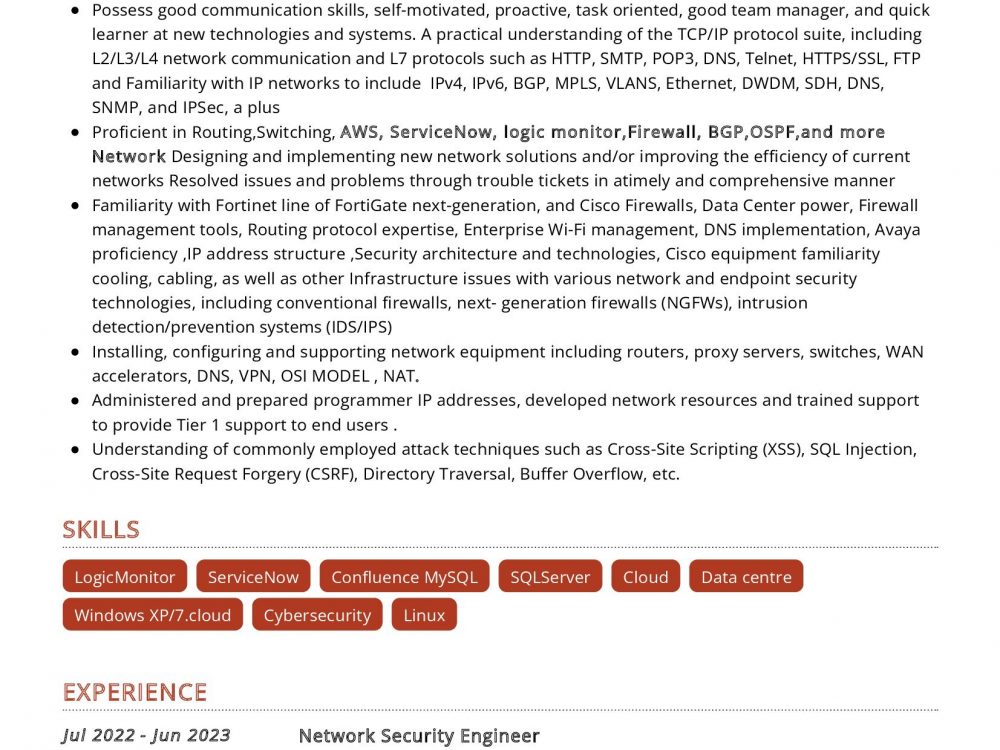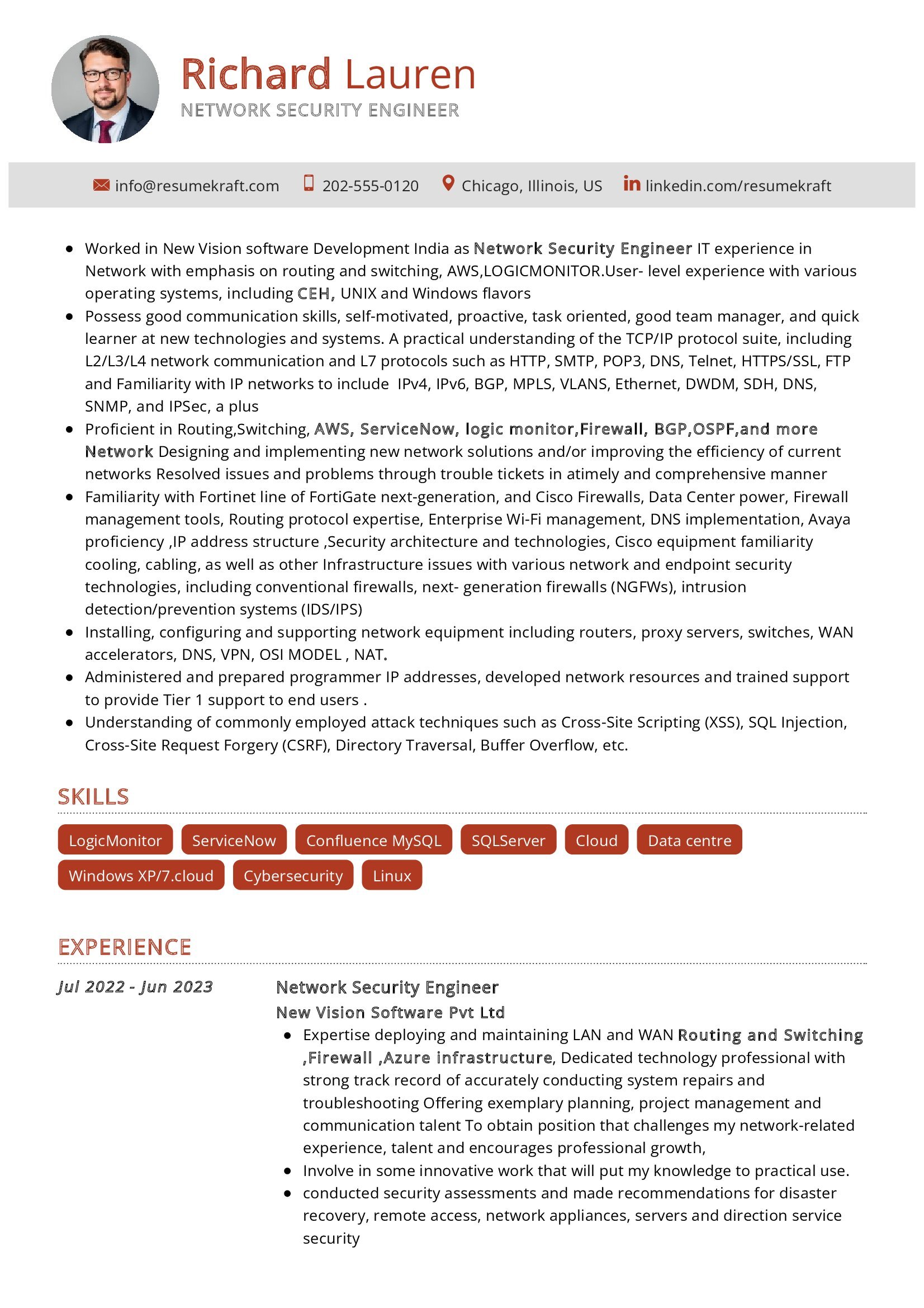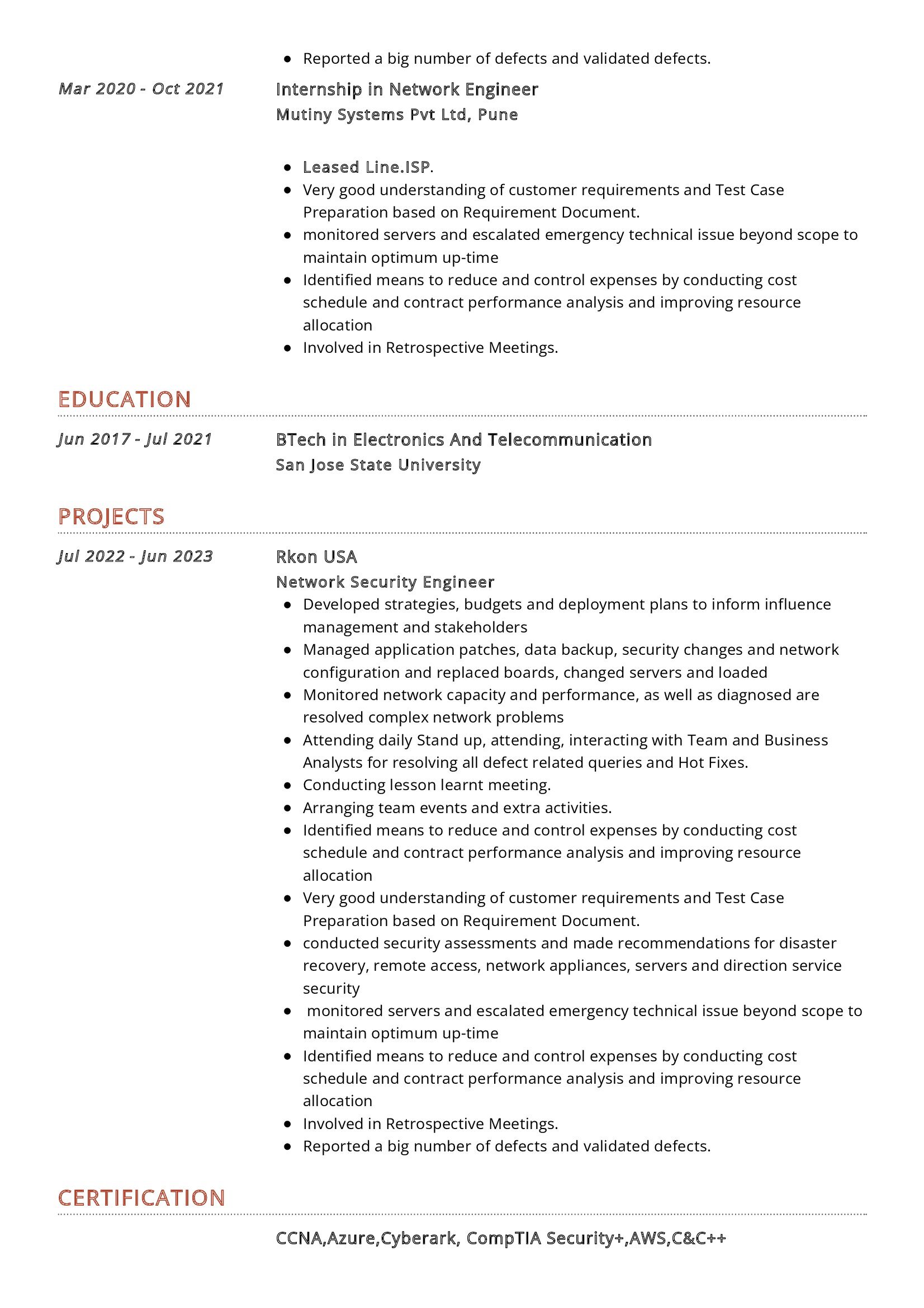The Role of a Network Security Engineer
In today’s interconnected digital landscape, the role of a Network Security Engineer has never been more crucial. This position combines technical expertise with the responsibility of safeguarding an organization’s digital infrastructure from cyber threats. Network Security Engineers are the guardians of data integrity and confidentiality, ensuring that networks remain secure and resilient. In this comprehensive guide, we’ll delve into the multifaceted role of a Network Security Engineer, from their job requirements to their responsibilities, and provide valuable tips for crafting an effective resume that reflects your expertise in this field.
Job Requirements for a Network Security Engineer
Becoming a Network Security Engineer involves meeting a set of rigorous requirements, a journey that demands continuous learning and hands-on experience. Let’s explore the prerequisites you need to fulfill to excel in this role:
- A Bachelor’s or Master’s degree in Computer Science, Information Technology, or a related field, showcasing a strong foundation in the technical domain.
- Profound knowledge of network protocols, encryption techniques, and security best practices.
- Experience in network administration and security, demonstrating a track record of increasing responsibility.
- Certifications such as Certified Information Systems Security Professional (CISSP), Certified Information Security Manager (CISM), or Certified Ethical Hacker (CEH) to validate your expertise.
- Strong problem-solving skills, honed through experiences in troubleshooting network security issues.
- Proficiency in network security tools and technologies, including firewalls, intrusion detection systems, and antivirus software.
- Effective communication skills, both written and verbal, to convey security concerns and strategies to non-technical stakeholders.
Obtaining additional certifications, staying updated with the latest security threats, and gaining hands-on experience are essential steps on your journey to becoming a successful Network Security Engineer.
Responsibilities of a Network Security Engineer
The role of a Network Security Engineer is diverse, encompassing various responsibilities that require technical acumen and strategic thinking. Let’s unravel the core duties that define this role, each contributing to the overall security posture of the organization:
- Designing and implementing network security measures to protect against unauthorized access and cyberattacks.
- Monitoring network traffic for suspicious activities and promptly responding to security incidents.
- Configuring and maintaining firewalls, intrusion detection systems, and other security infrastructure components.
- Conducting vulnerability assessments and penetration testing to identify and address security weaknesses.
- Collaborating with cross-functional teams to ensure that security measures align with business goals and compliance requirements.
- Creating and enforcing security policies and procedures to mitigate risks and safeguard sensitive data.
- Providing security awareness training to employees, promoting a culture of cybersecurity within the organization.
Each responsibility adds a layer of protection to the organization’s network, making it more resilient against evolving cyber threats.
Resume Writing Tips for a Network Security Engineer
Your resume is your professional story, and crafting one that highlights your expertise as a Network Security Engineer is crucial. Here are some tips to help you create an impactful resume:
- Emphasize your experience in designing and implementing network security solutions, showcasing specific projects and their outcomes.
- Highlight your certifications, such as CISSP or CISM, to demonstrate your commitment to professional development.
- Quantify your achievements with metrics, such as the percentage reduction in security incidents or the number of successful vulnerability assessments conducted.
- Customize your resume for each job application, tailoring your qualifications to match the specific requirements of the role.
- Include a skills section that lists your proficiency in network security tools and technologies.
Your resume is your first impression on potential employers, so make it a compelling one that reflects your expertise and dedication to network security.
Sample Network Security Engineer Resume Summary Examples
Your resume summary serves as the introduction to your career story. It should be concise yet impactful. Here are some examples to inspire your own summary:
- “Experienced Network Security Engineer with over 8 years of expertise in designing and implementing robust security measures. CISSP certified and dedicated to safeguarding digital assets against cyber threats.”
- “Results-driven Network Security Engineer skilled in proactively identifying vulnerabilities and developing effective solutions. Led a team that reduced security incidents by 30% in one year.”
- “Certified Network Security Engineer with a passion for staying ahead of evolving threats. Adept at configuring and maintaining security infrastructure to ensure data protection.”
Your resume summary should leave a strong impression, enticing employers to learn more about your qualifications.
Building a Strong Experience Section for Your Network Security Engineer Resume
Your experience section is where you showcase the depth of your expertise. Here are some examples of how to detail your experience as a Network Security Engineer:
- “Led a team of security analysts in implementing advanced firewall configurations, reducing the organization’s exposure to cyber threats by 40%.”
- “Conducted regular security assessments and identified and remediated 50+ vulnerabilities, enhancing the network’s resilience against attacks.”
- “Collaborated with the IT team to develop and enforce security policies, ensuring compliance with industry regulations and standards.”
Your experience section should tell a story of your accomplishments and contributions in the field of network security.
Education Section for Your Network Security Engineer Resume
Your educational background is the foundation of your career. List your relevant degrees and certifications to showcase your knowledge and qualifications:
- Master of Science in Cybersecurity, XYZ University, 2017.
- Bachelor of Science in Computer Science, ABC University, 2014.
- Certified Information Systems Security Professional (CISSP), 2016.
Each educational milestone represents a commitment to continuous learning and professional development.
Skills for Your Network Security Engineer Resume
Your skill set is your toolbox, equipped with a range of abilities essential for a Network Security Engineer. Here are the key skills you should possess:
Soft Skills:
- Problem-solving abilities, crucial for identifying and mitigating security vulnerabilities.
- Effective communication skills to convey security concerns and strategies to non-technical stakeholders.
- Attention to detail to ensure the accuracy of security configurations and policies.
- Team collaboration, as network security often involves working with cross-functional teams.
- Adaptability to stay ahead of evolving cyber threats.
Hard Skills:
- Proficiency in network security tools and technologies, such as firewalls, intrusion detection systems, and antivirus software.
- Knowledge of network protocols and encryption techniques.
- Experience in conducting vulnerability assessments and penetration testing.
- Understanding of security regulations and compliance requirements.
Each skill in your repertoire contributes to your effectiveness as a Network Security Engineer.
Common Mistakes to Avoid When Writing a Network Security Engineer Resume
When crafting your resume, avoid these common mistakes that can hinder your chances of landing your dream job as a Network Security Engineer:
- Using a generic resume for all applications, which fails to highlight your specific qualifications for each role.
- Focusing solely on job duties without showcasing your achievements and the impact you’ve made.
- Ignoring the importance of a well-written cover letter to introduce yourself and express your interest in the position.
- Overloading your resume with technical jargon that may be confusing to non-technical reviewers.
- Failing to proofread your resume, which can leave a negative impression on potential employers.
Avoiding these mistakes will help you create a resume that stands out and effectively communicates your qualifications as a Network Security Engineer.
Key Takeaways for Your Network Security Engineer Resume
As you wrap up the process of creating your Network Security Engineer resume, remember these key takeaways:
- Highlight your experience in designing and implementing network security solutions.
- Emphasize relevant certifications, demonstrating your commitment to professional development.
- Quantify your achievements to showcase your impact on previous organizations.
- Customize your resume for each job application, aligning your qualifications with the specific requirements of the role.
Now that you have a well-crafted resume that reflects your expertise as a Network Security Engineer, you’re better prepared to secure your desired role in the field of network security.
Finally, feel free to utilize resources like AI Resume Builder, Resume Design, Resume Samples, Resume Examples, Resume Skills, Resume Help, Resume Synonyms, and Job Responsibilities to create a standout application and prepare for the Network Security Engineer job interview.



